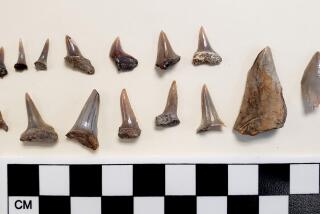Never mind science: America’s fossil record is up for sale
- Share via
An astonishing article in the latest issue of Science (purchase required) documents how America’s scientific patrimony--specifically, its fossil record--has come under the control of commercial interests.
They’re now marketing what are often scientifically significant finds to the highest bidder, often for use as home and office decor. The website of one firm cited by author Heather Pringle, Tucson-based GeoDecor, lists an inventory of fossil fish, “dinosauria,” mammals, and plants.
The article quotes one commercial fossil hawker as defending his business on traditional American cash-on-the-barrelhead terms: “If they don’t like the free enterprise system,” he says of the museums and researchers fuming about the trade in prehistoric artifacts, “don’t participate in it, but don’t demonize those that do.”
Large fossils can go for millions of dollars. Some collectors cooperate with paleontologists, allowing them access for research purposes; but others lock the specimens away in their private collections.
As is so often the case, what’s happened here is that the law has failed to keep up with an exploding commercial market. The 2009 Paleontological Resources Preservation Act restricts fossil collections on federal land to researchers with a permit, forbids the fossils’ sale, and requires them to be deposited in a museum or other approved institution.
But the law doesn’t govern excavations on private land, where commercial collectors can mine rich lodes of fossil history without government oversight, typically sharing their take with the landowner. Contrast that with Pringle’s description of the law in the Canadian province of Alberta, where all fossils belong to the government wherever they’re found. Excavations require permits, which typically go to paleontologists.
Museums aren’t innocent in the creation of a rich fossil trade. Pringle dates the trend to a bidding war for an enormous Tyrannosaurus Rex specimen won by Chicago’s Field Museum for nearly $8.4 million. The skeleton, dubbed “Sue the T. Rex,” has been the centerpiece of the museum’s display ever since. But the transaction set off a frenzy among fossil prospectors who soon drove prices beyond what most museums could afford.
Recently there’s been a softening in the private market. At a huge fossil auction in Manhattan last year some of the most important specimens failed to sell, including a double fossil of “dueling dinosaurs” expected to fetch $9 million. But if that reflects the economic slump, prices for once-buried treasure might head skyward again. Scientifically priceless fossils to decorate your remodeled kitchen? It’s the American way.
More to Read
Sign up for Essential California
The most important California stories and recommendations in your inbox every morning.
You may occasionally receive promotional content from the Los Angeles Times.











